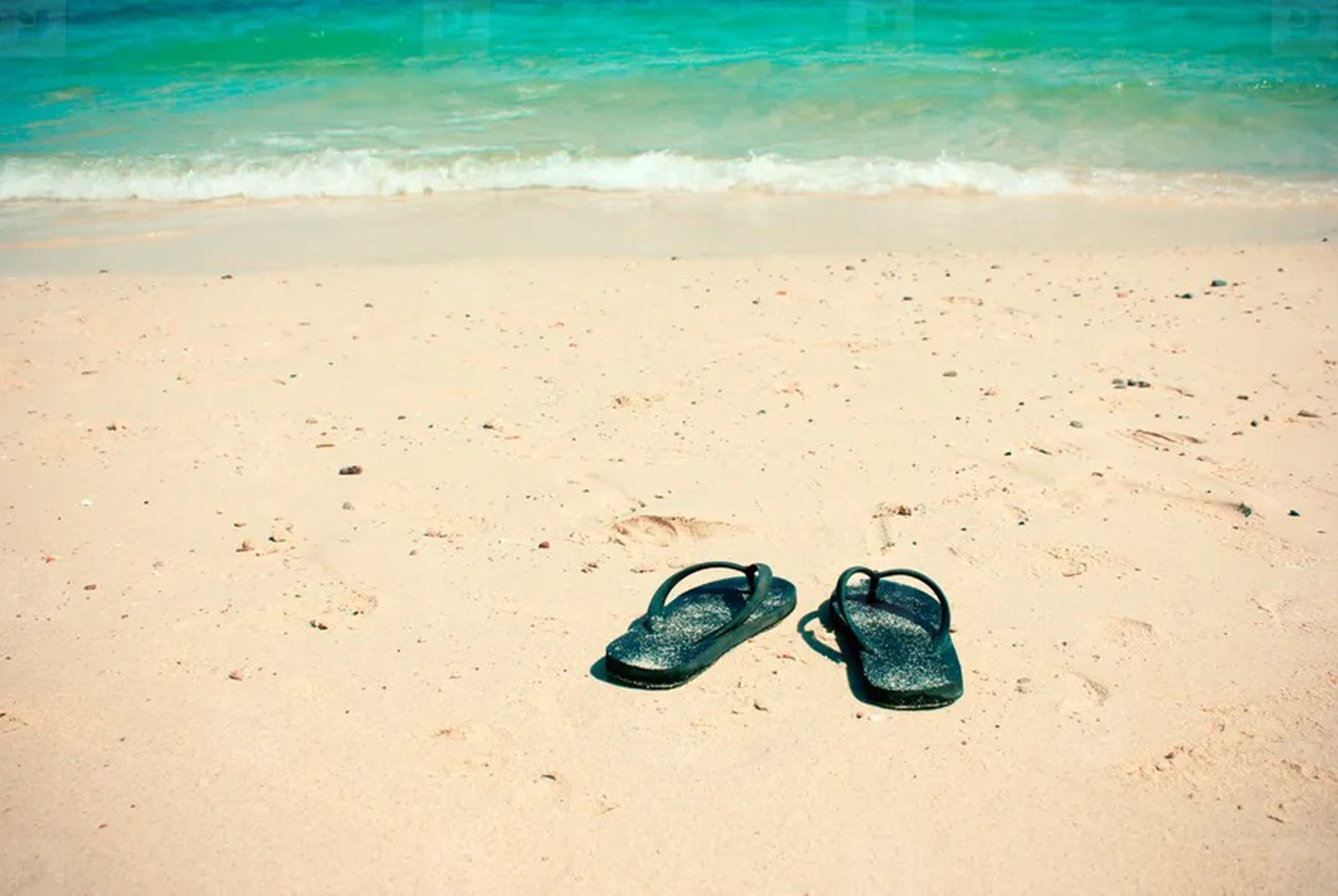The boy who lost his flip-flops to the sea

Source:Federico Davicino
In this op-ed, author Federico Davicino walks us through his story of a nine-year-old boy eager to join his older siblings on the ocean, and the lessons he learned. The boy becomes an unexpected expert on tides and it's not through traditional education.
Views
The boy who lost his flip-flops to the sea
By Federico Davicinoweb only
Every summer, when the waves are calm and the wind is just a breeze, a bunch of little kids with a bunch of little boats gather around Shanyuan Bay. Under Taitung’s brazen sun, only protected by the shade of the few coconut trees on the shoreline, we tie the sails on the sand, and we dip our feet in the water while the instructor (me) explains the class for the day. The ocean is our classroom.
Every May, after the monsoons have finally calmed down, it is time for me to bring the kids to the ocean to train. For the new kids, it is quite a challenge, but after spending a few years training on the lake, they are ready for a new adventure.
Sailing on the ocean, the vast, endless ocean. For the very first time, kids are half nervous and excited for the new endeavor, anxiously asking the instructor a string of questions. Is the ocean very deep? To which I always respond that it doesn’t matter how deep it is as long as we are on the boat.
Are the waves very big? Not in summer. Will we drift away forever? That is why I always go with a rescue motorboat for any issue that might arise.
I do my best to comfort their fears. The ocean is a big, scary place for many people. Could you imagine a 9-year-old going into their own wind-powered boat? As their anxiety slowly drifts away and the excitement takes over, they keep throwing questions at me.
Will there be sharks? I shake my head, and their expression relaxes an inch.
Will there be dolphins? I nod a few times, and their eyes sparkle with joy.
Dolphins are rare to see, I say, but turtles are more common. We even saw a whale last year. About then, everyone is ready to start moving to start the class.
 (Source: Federico Davicino)
(Source: Federico Davicino)
Last year, among the sailing squad, there was this little nine-year-old kid who insisted on joining the ocean sessions. I normally do not take such little kids, but he is the little brother of three and has been seeing his older sister and brother sailing on the ocean and going about races for a few years, and he couldn’t wait to join them. So, I decided to let him come on the very easy and calm days. I guess being the little one in the family, there is always the need to prove yourself to your siblings, no matter if you are scared; always be bold about it.
So, the first day that I brought him to the ocean, he didn’t stop talking for the entire car trip, rattling endlessly about his many sailing adventures in his short nine years lifespan. He was all proud and mighty about not being scared of capsizing, big waves, or strong winds. But once we stood in front of the ocean, getting the sails ready to go in, he became quiet. Inconspicuously, he pulled the sleeve of my rash vest and asked me very politely if I could sit on the boat with him, but please do not tell his older sibling that it was his idea.
Of course, I played along with my part. We sat in that tiny boat, experiencing for the first time the wind and waves of the ocean. As we were a little bit farther out, away from the shorebreak, I gave him control of the rudder. He was trembling and clenching his teeth at the beginning but relaxed eventually. After a while, he started to actually enjoy the ride and told me that the ocean was just a big, big lake, and next time he would try not to be so afraid and go on his own.
However, when we came back ashore, at the end of the class, I saw him roaming the beach with a nervous pace, and after ten minutes of seeking around, he came to me whispering, “I’ve lost my flip-flops; my mom is going to kill me, please help.”
So there we walked the beach up and down a couple of times. He pointed exactly where he left his shoes, still baffled that they were gone. Maybe it was a thief, but very improbable on these wide, empty beaches where we live. It was most probably the tide, so as we were walking back, I explained to him that the water level on the ocean goes up and down every day, and we need to be careful when we leave things on the beach.
Next Saturday, as we were getting ready for class, I saw him leaving his new flip-flops all the way up the beach. He told me that this way he was sure the tide wouldn’t eat them up. I said good job, and we carried on with the class. As we came back a few hours later, and the beach was double wide after the receding tide and the scorching midday sun had heated the sand. A few yards had become double the length, and walking the 25 meters barefoot all the way back to his shoes posed a different kind of challenge. He asked me to get his shoes for him, to which I said no.
And then he sprinted up, screaming and swearing my name until he finally got to his flip-flops. When the pain on his feet soothed, he came to talk to me again and asked me why last weekend the water level had been so high, and this time it had been so low. So I explained that the low tides and high tides do not follow our schedule but rather follow the moon, but it's better to go back and read a little bit about it.
From then onwards, and for the entire summer, I had very interesting conversations with this kid about the tide. He would come with some new bits of information every time and different strategies on where to leave his flip-flops. I taught him how to look out for some rocks that are visible only at low tide, to check for moss on the rocks, and some general observations of the size of the beach where we run the training every week. I also told him that he could use his mom’s phone to look up the tide on the Weather Bureau website, but not to completely rely on that information since it is often wrong, and the best is to compare it to the real-life situation and use your own judgment.
Completely driven by the fear of burning his soles again or his mom getting angry at him for another pair of lost flip-flops, this little kid became an expert on tides in the span of one summer. Not because the teacher had given him homework, but by his own motivation.
 (Source: Federico Davicino)
(Source: Federico Davicino)
Actually, in my experience, if I ever had to sit down nine ten-year-olds in a class and teach them about the weather, their span of attention won’t last 10 minutes, and everyone will start yawning and getting distracted. Maybe some teachers would say that kids nowadays are unable to focus and even dare to diagnose with some sort of hyperactivity and attention deficit disorder.
In my opinion, kids already spend enough time sitting still in a classroom, and what they need is to run, fall, feel, and use up their energy while experiencing the world itself.
As adults, we are well aware that making mistakes is the best way of learning. However, our education system still pushes for rote learning, memorizing, and examination. That is the complete opposite. Kids drown in homework, midterms, and very important final exams.
And as they grow up, even in winter and summer vacation, they need to carry on with their studies. Less and less time for leisure, unwind, and discover the world by themselves. No wonder we say that we all have lost contact with nature, because nature is not something that we read in books; it is something that we find in our daily life, for our eyes to see, our hands to touch, and our skin to feel.
Take an example such as this little kid that lost his flip-flops to the sea. Out of his cheeky reasons, he learned an unforgettable lesson and became an expert on the tides. He might not be able to put it down in words perfectly on an exam paper, but every time he goes into the ocean by himself, he has an inexplicable wordless conversation with the ocean, making nature his very best friend.
(This piece reflects the author's opinion, and does not represent the opinion of CommonWealth Magazine.)
Have you read?
Uploaded by Ian Huang






